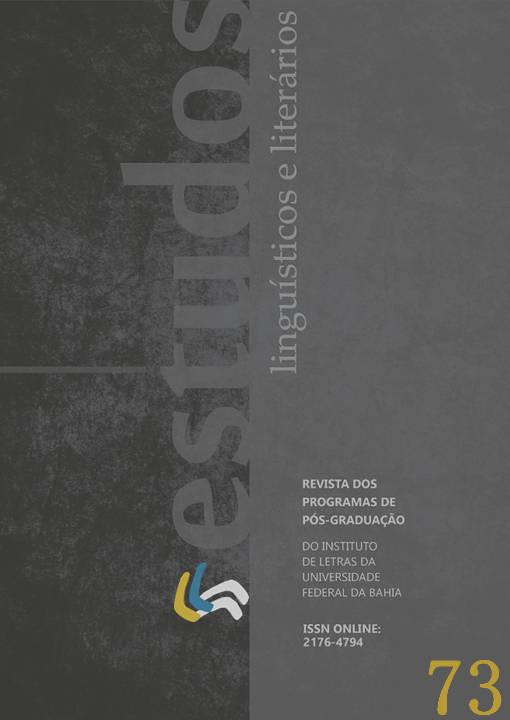DECOLONIZING KNOWLEDGE
THE IMPORTANCE OF SIGN LANGUAGE LITERATURE FOR DEAF STUDENTS
DOI:
https://doi.org/10.9771/ell.i73.47979Keywords:
Deaf literature, Deaf identity, Libras and literatureAbstract
This article aims to present some considerations about the importance and function of sign language literature for the construction of deaf students' identity. In Brazil, for twenty years, Libras - Brazilian Sign Language has been established as a language of communication and expression of the deaf community through Law nº 10.436/2002 and, since then, an arduous work has been developed by professionals in the area in order to enforce the Libras Law in the most diverse environments. Deaf literature – created in Libras – plays a fundamental role in shaping the identity of deaf students through the cultural representations of this community. Through it, it is possible to demonstrate that deafness can be seen only as a linguistic difference and not as a disability, as the clinical view claims, as Libras has the same functions and characteristics as oral languages. In addition, for deaf students, deaf literature brings with it the power of playfulness, imagination and self-recognition as subjects of value in a mostly hearing society. Researcher and professor Dr. Lodenir Karnopp, together with the deaf poet Dr. Cláudio Mourão, explore in various materials the relevance of offering deaf literature so that more and more deaf people feel protagonists of their own history.
Downloads
References
BRASIL. Decreto Nº 5.296, de 02 de dezembro de 2004. Dispõe sobre normas gerais e critérios básicos para a promoção da acessibilidade das pessoas portadoras de deficiência ou com mobilidade reduzida. Diário Oficial da República Federativa do Brasil, Brasília, D.F., 02 dez. 2004. p. 23. Disponível em: http://www.planalto.gov.br/ccivil_03/_ato2004-2006/2004/decreto/d5296.htm Acesso em: 04 de fev. de 2022.
CANDIDO, Antônio. O direito à literatura. In: CANDIDO, ANTONIO. Vários escritos. 3.ed. ver. ampl. São Paulo: Duas Cidades, p. 24, 1995.
CARVALHO, Luiz Claudio da Costa. Lendas da identidade: o conceito da literatura surda em perspectiva. 1. Ed. Curitiba: Appris Editora, p. 156, 2019.
COMPAGNON, Antonie. Literatura para quê? Trad. Laura Taddei Brandini, Belo Horizonte, ed. UFMG, 2009.
COSTA, Kleber Martiniano et al. Educação bilíngue para surdos: tudo certo como dois e dois são cinco. Grau Zero — Revista de Crítica Cultural, v. 9, n. 1, 2021, p. 23-49, nov. de 2021. Disponível em: https://revistas.uneb.br/index.php/grauzero/issue/view/603 Acesso em: 31 de jan. de 2022.
DEFICIÊNCIA AUDITIVA. Fiocruz, 2007. Disponível em: http://www.fiocruz.br/biosseguranca/Bis/infantil/deficiencia-auditiva.htm Acesso em: 31 de jan. de 2022.
IBGE – Instituto Brasileiro de Geografia e Estatística. Censo brasileiro de 2010. Rio de Janeiro: IBGE, 2012. Censo 2010.
KARNOPP, Lodenir. Literatura Surda, Florianópolis, p. 2, 2008.
MOURÃO, Claudio Henrique Nunes. Literatura surda: experiência das mãos literárias, 2016, 286 p. UFRGS, Porto Alegre.
NICHOLS, Guilherme. Literatura Surda: além da língua de sinais. 2016, 184 p., Literatura surda, Faculdade de educação, Universidade Estadual de Campinas, Campinas, SP.
PERLIN, Gladis. MIRANDA, Wilson. Surdos: o narrar e a política, ponto de vista, Florianópolis, n.5, p. 217-226, 2003.
PORTO, Shirley; PEIXOTO, Janaína. Literatura Visual. 2011. Disponível em: <http://biblioteca.virtual.ufpb.br/files/literatura_visual__1330351986.pdf>. Acesso em: 05 de fev. de 2022.
SKLIAR, Carlos. A surdez: um olhar sobre as diferenças. 2. Ed. Porto Alegre: Mediação, 1998.


